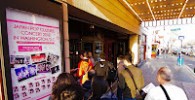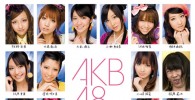When you talk about the biggest indication of AKB48’s popularity, what you bring on the table?
Record sales, the number of fans gather at handshake events, or Tokyo dome concerts in the last year?
Why 70,000 fans attended 2NE1’s debut concert in Japan when they sold their debut single far fewer than 70,000 copies
In 2011, Korean group called 2NE1 made a debut concert in Japan, and about 70,000 fans (!) flocked to their concert venue. It’s was a surprising number and the news made top page of the entertainment section of various Japanese tabloid papers.
Starting from Yokohama Arena, 2NE1’s debut tour in Japan was held for 6 times in a couple of big Japanese cities, Kobe and Tokyo.
2011 was the peak of K-pop boom in Japan, and 2NE1’s achievement came as a sensational news and people started thinking K-pop might be a real threat to Japanese music industry.
For your reference, the number of audience attended other K-pop act’s debut concerts are far lower than 2NE1. 少女時代 (Shoujo Jidai / Girls Generation / SNSD in South East Asia) got 22,000 audiences, 2PM 25,000, SHINee 30,000.
But there’s a peculiar thing. 2NE1 made record debut in Japan in October 2011.
The record is titled “NOLZA” and sold 26,000 copies in it’s first week after release. This means most of fans who went to 2NE1’s debut concert didn’t even buy the group’s debut single.
Let’s take a look at Google.
There is a tool called Google Insights Search, which gives us a insight of how popular specific keywords are.
New generations K-pop bands are less than nothing except SNSD and Kara
When you search “少女時代”, “KARA”, “2NE1”, “SHINee” and “AKB48”, only Kara had a time when they’re more popular than AKB48, which was on January 2011 when Kara members canceled contracts with their old agencies, which mean the story was most likely consumed as good resource for K-pop bashing on the Japanese internet.
While AKB48 got 2 spikes in the last 2 years, needless to say, it was elections.
Anyways what Google Insight Search tells us is while SNSD or Kara have decent presence in Japan, other groups like 2NE1 or SHINee are less than nothing in Japan. (Big Bang’s presence is smaller than SHINee in Japan, by the way)
It’s reported about 300,000 people applied to 2NE1’s debut concert, but strangely such popularity of the group can’t be at all seen in the popularity in Google search. One possible explanation for this may be since there’s few Japanese news source about K-pop, people don’t search but just watch Youtube videos.
My personal impression of overall Japanese people’s impression on K-pop is although many group come to Japan dubbed flamboyantly, the only Korean groups Japanese know are still the three bands. Namely SNSD, Kara and 東方神起.
The K-pop Bubble
Newsweek’s write up on “K-pop Bubble”, published in September of 2011, suggest growth of K-pop’s fanbase in Japan has stagnated.
After the big breakthrough Kara or SNSD made in the summer of 2010, many Japanese record labels jumped on K-pop bandwagon, competing to secure contract with K-pop bands that seem to have potential to become big hits in Japan. Numerous of manufactured K-pop bands made debut in Japan one after another, all marketed with crazy catchcopies like “The Ultimate Weapon of K-pop” or “The Strongest Military” or even… “The Last Empress“.
But Newsweek says “K-pop hasn’t expanded it’s fanbase in Japan since it’s peak in 2010.”
Furuya, the music journalist who is familiar with Korean Music industry points out “Most of current fans of K-pop in Japan are fans of 東方神起 (known as TVXQ! in South East Asia)”.
The male idol group made Japan debut in 2005, has gained solid fanbase through traveling aroung Japan for promotion just like any other sprouting Japanese bands. They got big breakthrough in 2007, but ended up being stuck in legal battle against their agencies, and disbanded in 2009 at the their career peak in Japan.
The number of fans of TVXQ are said to be more than hundreds of thousands
“The number of fans of TVXQ are said to be more than hundreds of thousands, and these people began to get interested in other K-pop bands as they are convinced a Korean band can be so adopted to Japanese entertainment industry by TVXQ’s success. And in Korea, it’s so happened that SNSD was dominating the music scene at the time.
Simply put, SNSD could become so popular in Japan all thanks to TVXQ’s enormous success.
There’re of course people who have become K-pop fans after TVXQ, but overall most of current K-pop fans are, the people who play a major role to make K-pop still in the game in Japan are those who started listening K-pop because of TVXQ.”
90% of K-pop fans in Japan are females. When you go to K-pop concert in Japan, most of audiences are women. People in the industry first thought female K-pop bands would never go big in Japan since in Japan marketing idols as sex symbols can never go mainstream. Several bands tried to break the ice, but all ended up failures.
But in February of 2010, young girls flocked to Kara’s first event in Japan. Thr group surely caught young Japanese girls hearts. Media wrote a headlines hyping there may be an early sign of K-pop boom in Japan.
But it’s the rule of the world that those who can easily get hooked on new stuffs are those who are easy to get tired of them. There’s no way that other music acts can reproduce TVXQ’s success in Japan, which was the result of their years of ground work in Japan. But at the time of 2011, Japanese record labels were crazy about purchasing contracts with K-pop acts that the Korean music industry was producing unrestly. Because it financially makes sense to buy already professionally trained K-pop bands at “cheap” price instead of finding domestic talents and invest a bunch of money to develop their music and presentation skills.
So when will this K-pop bubble -which seems just consuming the asset created by TVXQ and (if you remember) Bae Yong-joon (who is still incredibly popular in Japan)– burst?
Usami, the chief editor of Korean Entertainment Magazine “Han Fun!” expressed his concern, saying “If dozens of idols groups flock to Japan at once, people may be overwhelmed and lose interest in K-pop in general.”
There’s another famous story that Japanese people as well as Koreans who take the future of K-pop in Japan seriously It’s a question that “Is K-pop just trying to make easy money off of Japan? If so, won’t it hurt K-pop in the long run?”
The amount money people pay for K-pop events such as fan meetings or concerts are more expensive than price for the events of Japanese idols like Johnny’s or popular Western artists like Lady Gaga. K-pop is about 30 to 50% more expensive than these music acts.
Usually fan meeting of K-pop bands in Korea is free, while in Japan, they charged fans a whopping price – normally somewhere around 100 USD – even though actors or singers only sing one or two songs, playing casual games, enjoying a brief talk with fans.
Bae, the writer at Korea online news paper My Daily complained about the way Korean music industry doing business in Japan, “I don’t think it’s a good idea to pay little attention to long term satisfaction of fans in order to focus on near-term profits. Current system where fans have to pay unreasonably expensive fee will never affect K-pop’s long term growth in a good way.”
Instead of simply glorifying the concept of hallyu and obsessing over the “exclusivity” and “uniqueness” of K-Pop, the Korean media should understand that when artists are debuting in the U.S. with English songs, people don’t care if it’s J-Pop or K-Pop.
Source: (cnngo)
[ Next time, I will write about how AKB48’s success is bigger version of TVXQ’s success in Japan. When K-pop goes “Global” in order to get a pie in Western Market, AKB48 goes extremely “Local”, which is why K-pop after TVXQ went wrong. Plus, while K-pop is cranking out a degraded version of American pop music, (and it’s worth nothing that the fact they are creating music like a factory means they are playing a losing game. it’s impossibly hard to keep producing high quality music to compete America) AKb48 is not selling their music not simply as music but they successfully incorporated CD business into the whole new story called “Idols who you develop” ]











